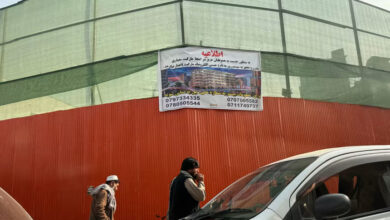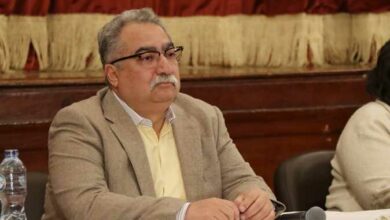Minister of Culture Farouk Hosni formed a committee of legal experts and professors from Egypt’s High Cinema Institute to investigate the state of extreme agitation currently gripping the institute. The committee found all decisions taken by the dean of the institute, Adel Yehia, to have been legal. Yehia is now awaiting implementation of his decision to amend the institute’s regulations on attendance, which had previously deprived some 30 percent of the students from sitting for exams.
Al-Masry Al-Youm met with Adel Yehia to discuss the reasons for the current crisis and how he plans to deal with it.
Al-Masry Al-Youm: What was the impact of the culture minister’s decision to amend the institute’s internal regulations?
Adel Yehia: Just to clarify, I made this decision one year ago, and the academy approved it. Then it was submitted to the minister for his approval.
Al-Masry: If everything you did was legal, as the committee said, then why was there such a fuss?
Yehia: The important question is, who protects a public employee who abides by the law? I’m just another employee who implements regulations that he did not put in place. It’s not my job to be unreasonably strict with students. Still, she took her exam. People have put together a law, and now they want me to violate it. Besides, the institute has a council responsible for taking such decisions.
Al-Masry: Are there conflicts among the institute’s professors, which are reflected by the students?
Yehia: The professors told students that they hadn’t deprived anyone of taking his or her exams and that it was the dean who is responsible for this. But this is not true. If they would like me to violate the regulations, then that means they want me to be corrupt. The problem is, I’m a straightforward person and I challenge anyone to question my financial, ethical or professional integrity.
Al-Masry: Was there any form of manipulation with regards to the purchase of a camera?
Yehia: I was not the dean of the institute when the camera in question was bought. The accounting process should reveal who was in fact responsible for that problem.
Al-Masry: Is there corruption at the institute?
Yehia: Supposing I am corrupt, then what has this got to do with preventing some students from taking their exams? Still, it was I who lowered the percentage of required attendance from 75 percent to 60 percent. Yet they still said I was being unfair.
Al-Masry: Were you threatened?
Yehia: Yes. Hassan Abdeen, who is responsible for complaints and popular organizations at the People’s Assembly, told me that [Parliamentary Speaker] Fathi Sorour had a complaint that I had to respond to, and so I did. But he claimed that I had not responded, so I sent it again. Then he sent for a third time, and when I looked into the matter, I found the whole matter before court.
Al-Masry: How can this be perceived as a threat?
Yehia: I received threats like, “See what will happen to you,” and, “Please let X pass because he’s the son of Y, who is crazy, and nobody can predict what he might do.”
Al-Masry: Doesn’t your position at the institute protect you?
Yehia: My position as dean is more of a government job, just like any other. When I assumed my position at the institute, the leadership had not been firm enough. But that isn’t the mistake of the former dean; perhaps the pressure he faced forced him to be lenient.
Al-Masry: Because students are often from the elite?
Yehia: Yes, they are influential and often believe they are above the law.
Al-Masry: But students have complained about your threats…
Yehia: I’ll tell you what happened. I asked the students to finish their graduation projects before 1 March, but they didn’t–so I pushed the deadline to mid-March, and then to mid-April. My idea was to collect their projects before 1 May, so that the jury would have enough time to grade the projects. So far, I have only received ten projects.
Al-Masry: Why are most of the professors at the institute moving to private institutes?
Yehia: the government hasn’t safeguarded the prestige of professors, so they have come to prefer private institutes. Every other day, a professor comes to me asking for permission to travel.
Al-Masry: Was it by coincidence that you assumed this position at the institute?
Yehia: I graduated from the faculty of commerce in 1985 before obtaining a diploma in artistic criticism. I never imagined I would end up at the cinema institute.
Al-Masry: Why have officials attacked your decision to withdraw the institute’s movie from the Leqaa el-Soura Film Festival?
Yehia: I was in Morocco when I was told that there was an Israeli movie being screened at the festival. I checked with Latifa Fahmi of the French Cultural Center, and she confirmed the information. So we withdrew our movies and I issued a statement in the name of the cinema institute. This is when officials began attacking me.
Al-Masry: If you were in Egypt, would you have watched a movie directed by an Israeli?
Yehia: Yes, and if I had a movie directed by me, I would have had it screened alongside the Israeli one. There are Israeli agriculture experts in Egypt. Besides, Israeli art and culture is penetrating the world; Israel has three cinema institutes. We still bury our heads in the sand fearing normalization. I’m for reading their books, watching their movies and listening to their music. Why should we see their movies outside Egypt yet ban them inside it?
Translated from the Arabic Edition.




